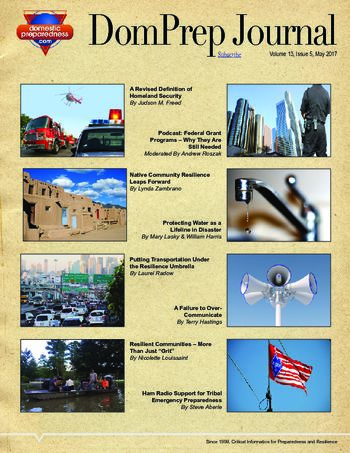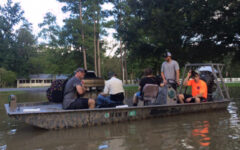

A Revised Definition of Homeland Security
Judson Freed
May 31, 2017
A top-down approach provides guidance and support from federal agencies to local jurisdictions. A bottom-up approach ensures that local needs are being heard at the top. However, when local agencies are tasked with national security efforts, more guidance and support may be needed from above. It is time to
prioritize resources, measure preparedness and response capabilities, and build and support national
capabilities locally by redefining homeland security in today’s environment.

Protecting Water as a Lifeline in Disaster
Mary Lasky and William R. Harris
May 17, 2017
Water is vital to life. Water and wastewater are taken for granted, with people believing that the faucet will turn on and the toilet will flush – that is, until a disaster. To ensure access to critical resources such as water when needed the most requires understanding the scale and scope of the problem, identifying ways to preserve such lifeline services, and strategizing to best allocate these resources during both disaster and non-disaster times.

Resilient Communities – More Than Just “Grit”
Nicolette Louissaint
May 16, 2017
The hurricane season and reports of disease outbreaks – domestically and abroad – serve as reminders that there are several threats that communities face at the same time. Creating resilient communities requires an understanding that communities contend with competing priorities, and must find ways to harness their existing strengths to improve their preparedness and response capabilities.

Putting Transportation Under the Resilience Umbrella
Laurel J. Radow
May 10, 2017
As interdependencies between and among critical infrastructure sectors and the potential for cascading effects increase, communities must be able to recover and adapt to new normals. One organization incorporates research to help enhance communication between sectors by identifying and addressing research gaps. As threats evolve, communities with a solid framework for resilience are better prepared to update plans and adapt to new normals.

A Failure to Over-Communicate
Terry Hastings
May 10, 2017
Emergency managers (and others) often fail to truly engage and educate their various stakeholders.
With numerous competing priorities and a vast array of information outlets to contend with, getting a
message to resonate requires more effort than ever before. As such, emergency managers must be willing
to over-communicate and explore new ways to educate people. Much like disaster preparedness,
communication is an ongoing process that requires a sustained commitment.

Native Community Resilience Leaps Forward
Lynda Zambrano
May 3, 2017
As in any community, a solid network of partnerships is needed to address the specific needs of its community members. Native American and Alaska Native populations span the nation,

